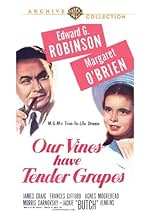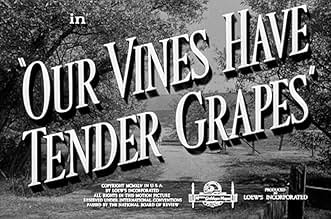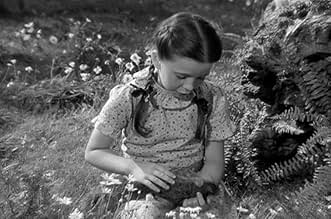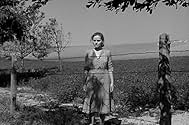AVALIAÇÃO DA IMDb
7,6/10
2,5 mil
SUA AVALIAÇÃO
Adicionar um enredo no seu idiomaA Norwegian farmer lovingly raises his daughter in rural World War II-era Benson Junction, Wisconsin.A Norwegian farmer lovingly raises his daughter in rural World War II-era Benson Junction, Wisconsin.A Norwegian farmer lovingly raises his daughter in rural World War II-era Benson Junction, Wisconsin.
- Direção
- Roteiristas
- Artistas
- Prêmios
- 2 vitórias no total
Abigail Adams
- Girl
- (não creditado)
Robert Anderson
- School Boy
- (não creditado)
- Direção
- Roteiristas
- Elenco e equipe completos
- Produção, bilheteria e muito mais no IMDbPro
Avaliações em destaque
I was first drawn to this movie because it draws heavily on Swedish immigrant culture in the mid-1900s. My family was a Swedish farm family and there was a comfortable familiarity about the movie.
It's also a sentimental movie, but not in a saccharine way. The cadence is very slow and deliberate, like old Laurel and Hardys, or Thin Red Line. But because of this it makes you settle in and think about all the things that are happening to this family and their community. The sweetness is cut by ordinary tragedies, though these could have been better developed.
The movie celebrates family values, but not in a harping rhetorical sense. This is about family members who truly love each other, and stay open to and embrace changes from both outside and within. I was touched by this movie, and found it to be healing of my ideas regarding family.
Excellent performances by Moorhead, Robinson and O'Brien.
It's also a sentimental movie, but not in a saccharine way. The cadence is very slow and deliberate, like old Laurel and Hardys, or Thin Red Line. But because of this it makes you settle in and think about all the things that are happening to this family and their community. The sweetness is cut by ordinary tragedies, though these could have been better developed.
The movie celebrates family values, but not in a harping rhetorical sense. This is about family members who truly love each other, and stay open to and embrace changes from both outside and within. I was touched by this movie, and found it to be healing of my ideas regarding family.
Excellent performances by Moorhead, Robinson and O'Brien.
Of course you don't know me, but if you believe that I am the furthest thing from a sentimental person, you should trust me when I say this film (the title of which I cannot even bring myself to reproduce it's such a HORRIBLE title, one of the worst ever) blew me away. This film is like Debussey's music, it flows along and has a spontaneous quality to it, as if it weren't planned at all. The LACK of conflict for at least the first hour is a BOLD move esthetically. It took real guts to make this film, and real skill too. Those who would criticize its lack of "realism," its failure to acknowledge the DARK SIDE know not what they do. We NEED movies which acknowledge the fact that life can be good, that childhood can be fun, that the effortless insights of children make us laugh. I am still laughing at Arnold, who in one scene in the barn bombards Martinius and Selma with "why" after "why" after "why." "Why can't I go to school?" asks Arnold. "Because you're too young," answers Selma. "Why am I too young?" he asks. "Just because you are." "But why?" he asks again. "Because." Maybe it's just me, but that is one hilarious exchange of dialogue, one of many in the film. Margaret O'brien is BRILLIANT in these scenes, astonishingly natural in front of the camera.
Sure there are attempts to get deep about the war, and there are other "literary" moments of forced deepness, but overall this is one RARE piece of film ART, and an unjustly ignored CLASSIC.
Sure there are attempts to get deep about the war, and there are other "literary" moments of forced deepness, but overall this is one RARE piece of film ART, and an unjustly ignored CLASSIC.
One of Edward G. Robinson's most beloved films is this one in which he totally reverses type and becomes the wise father of Margaret O'Brien. Our Vines Have Tender Grapes and the tender grapes referred to are the children in their innocence, Margaret O'Brien and Jackie Jenkins.
In this rural Wisconsin town where few even have electricity, the settlers are mostly Norwegian immigrants who did like our American Midwest climate because it was so similar to Norway. They are a tight knit group and are a reserved bunch. But as the film shows, during a crisis they do come together.
O'Brien and Jenkins are an appealing pair of youngsters. Their childhood is a whole lot like Tom Sawyer's and Huck Finn's. Of course in one instance they try duplicating something Tom and Huck did that nearly turns tragic.
Agnes Moorehead also shows what a capable player she is in playing Robinson's wife and O'Brien's mother. I'm sure she was grateful for not playing an evil woman for a change.
There is a subplot involving a romance of editor James Craig and new school teacher Frances Gifford. Gifford is first quite resistant to the town, she's a big city girl, but she warms up to them and Craig.
But the film really belongs to Robinson and O'Brien. Robinson has a tough fight, but he more than holds his own in scenes with the little moppet. Sad he didn't do more films like this.
Our Vines Have Tender Grapes is a timeless classic, I think children and families of any age will identify and love it.
In this rural Wisconsin town where few even have electricity, the settlers are mostly Norwegian immigrants who did like our American Midwest climate because it was so similar to Norway. They are a tight knit group and are a reserved bunch. But as the film shows, during a crisis they do come together.
O'Brien and Jenkins are an appealing pair of youngsters. Their childhood is a whole lot like Tom Sawyer's and Huck Finn's. Of course in one instance they try duplicating something Tom and Huck did that nearly turns tragic.
Agnes Moorehead also shows what a capable player she is in playing Robinson's wife and O'Brien's mother. I'm sure she was grateful for not playing an evil woman for a change.
There is a subplot involving a romance of editor James Craig and new school teacher Frances Gifford. Gifford is first quite resistant to the town, she's a big city girl, but she warms up to them and Craig.
But the film really belongs to Robinson and O'Brien. Robinson has a tough fight, but he more than holds his own in scenes with the little moppet. Sad he didn't do more films like this.
Our Vines Have Tender Grapes is a timeless classic, I think children and families of any age will identify and love it.
I'm normally a pretty sensitive guy but rare is the time, especially with movies these days (I'm in my early 40s), that I feel joy or sorrow or anything at all, for that matter, at a movie. I think most of them are made by people who have nothing to say.
This film is different. I actually found myself a couple times with tears rolling down my cheeks and I was happy to have that feeling. And there were times that my heart soared here too.
I must first say that I have always loved Edward G. From Little Caesar to The Sea Wolf and more, this is an actor's actor. He is authoratative here for sure, but in a tender and fair way. It made me see him in a completely different and more sympathetic light. He is a real "little guy" here. When he balks
at physically punishing his daughter for being selfish with the roller skates, I wish I could make every parent today see that scene.
Strange as it may seem, Agnes Moorehead is an idea match wife for Edward G.
Known for "Bewitched" or Orson Wellesian weirdo-type characters, we usually
see her as kind of a cold loser whose life has passed her by. She is so credible and so good here, you can see a light shine from within. When she expresses
pride in the children, it is real. Robinson and Moorehead are what make this
movie real and are the forces of good who influence children to grow up right.
Now a word about the courtroom scene when the girl offers her calf and
everyone starts offering increasingly valuable parts of the farm to give to the stricken farmer. To say this scene reflected communism is like saying It's a
Wonderful Life reflects communism. It's totally ridiculous. It is Capra-corn of the highest order and is just one of many scenes in a movie performed by people
who believe every word the screenwriter wrote, directed by a person of vision and written with a heart.
So if you are a bit more sentimental and want a film that is real and has a heart, and is far enough removed from all the ADD and ritalin and child abuse we
have now, this one will make you forget about the regrettable way things go
today and the way things should be.
This film is different. I actually found myself a couple times with tears rolling down my cheeks and I was happy to have that feeling. And there were times that my heart soared here too.
I must first say that I have always loved Edward G. From Little Caesar to The Sea Wolf and more, this is an actor's actor. He is authoratative here for sure, but in a tender and fair way. It made me see him in a completely different and more sympathetic light. He is a real "little guy" here. When he balks
at physically punishing his daughter for being selfish with the roller skates, I wish I could make every parent today see that scene.
Strange as it may seem, Agnes Moorehead is an idea match wife for Edward G.
Known for "Bewitched" or Orson Wellesian weirdo-type characters, we usually
see her as kind of a cold loser whose life has passed her by. She is so credible and so good here, you can see a light shine from within. When she expresses
pride in the children, it is real. Robinson and Moorehead are what make this
movie real and are the forces of good who influence children to grow up right.
Now a word about the courtroom scene when the girl offers her calf and
everyone starts offering increasingly valuable parts of the farm to give to the stricken farmer. To say this scene reflected communism is like saying It's a
Wonderful Life reflects communism. It's totally ridiculous. It is Capra-corn of the highest order and is just one of many scenes in a movie performed by people
who believe every word the screenwriter wrote, directed by a person of vision and written with a heart.
So if you are a bit more sentimental and want a film that is real and has a heart, and is far enough removed from all the ADD and ritalin and child abuse we
have now, this one will make you forget about the regrettable way things go
today and the way things should be.
It's true - this is about as nice as it ever got with a movie. There are no villains, no violence (except when animals had to be destroyed in a fire...and that wasn't pictured), and just a nice story of a nice Norwegian family living in rural Wisconsin.
The story emphasizes two members of the family: the 7-year-old daughter, played by 1940s child star Margaret O'Brien, and her father, played by famous tough-guy actor Edward G. Robinson. This is Robinson as you rarely saw him and refreshingly low-key.
Yes, O'Brien tends overact a bit, but some of her lines are so touching, so moving and delivered with such a soft, sweet voice that she gets away with them. Her gesture at the end of the film - no "spoilers" here - is so astounding I doubt it would ever happen in real life.....but it's wonderful to see.
James Craig, Frances Gifford, Agnes Moorhead and Jackie "Butch" Jeknins all add to this old-fashioned wholesome film. (If those words turn you off, by all means, skip this movie.) Jenkins can be a bit much, but he does add humor to the movie. Craig and Gifford make an attractive couple.
This movie is highly recommended for those of you who want a break from films with "bad guys" and a lot of "edginess."
The story emphasizes two members of the family: the 7-year-old daughter, played by 1940s child star Margaret O'Brien, and her father, played by famous tough-guy actor Edward G. Robinson. This is Robinson as you rarely saw him and refreshingly low-key.
Yes, O'Brien tends overact a bit, but some of her lines are so touching, so moving and delivered with such a soft, sweet voice that she gets away with them. Her gesture at the end of the film - no "spoilers" here - is so astounding I doubt it would ever happen in real life.....but it's wonderful to see.
James Craig, Frances Gifford, Agnes Moorhead and Jackie "Butch" Jeknins all add to this old-fashioned wholesome film. (If those words turn you off, by all means, skip this movie.) Jenkins can be a bit much, but he does add humor to the movie. Craig and Gifford make an attractive couple.
This movie is highly recommended for those of you who want a break from films with "bad guys" and a lot of "edginess."
Você sabia?
- CuriosidadesJerry Maren, a member of the Lollipop Guild from O Mágico de Oz (1939), stood in for Margaret O'Brien in the scene where she is floating down the river in a bathtub.
- Erros de gravaçãoIn the opening scene, during the two-shot of Selma Jacobson and Arnold Hanson, he can be seen mouthing her lines as she says them.
- Citações
Martinius Jacobson: [Entering Bjornson's new barn] You can still smell the new wood... finest smell on the earth.
- ConexõesFeatured in A Night at the Movies: Merry Christmas! (2011)
- Trilhas sonorasEntry of the Gladiators
(1897) (uncredited)
Written by Julius Fucík
In the score during the elephant sequence
Principais escolhas
Faça login para avaliar e ver a lista de recomendações personalizadas
- How long is Our Vines Have Tender Grapes?Fornecido pela Alexa
Detalhes
- Data de lançamento
- País de origem
- Idioma
- Também conhecido como
- El sol sale mañana
- Locações de filme
- Empresa de produção
- Consulte mais créditos da empresa na IMDbPro
- Tempo de duração1 hora 45 minutos
- Cor
- Proporção
- 1.37 : 1
Contribua para esta página
Sugerir uma alteração ou adicionar conteúdo ausente





































